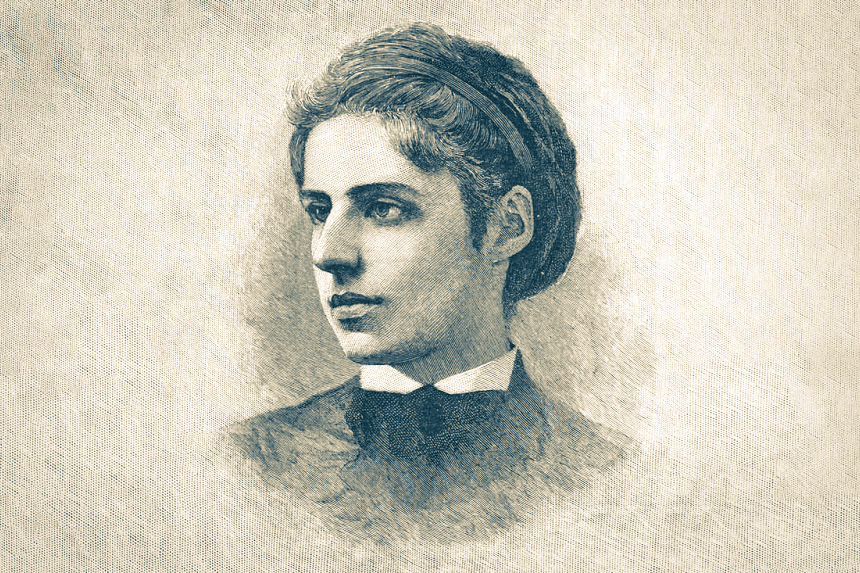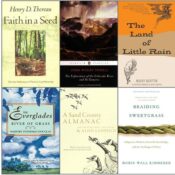In 2017, President Trump’s senior policy advisor Stephen Miller disagreed with CNN reporter Jim Acosta about the meaning of the Statue of Liberty. After Acosta repeated the well-known verse inscribed at the base of the statue (“Give me your tired,/ your poor,/ Your huddled masses yearning to/ breathe free… ) along with a question about Trump’s support of reducing immigration, Miller said, “the Statue of Liberty is a symbol of American liberty enlightening the world. The poem that you’re referring to was added later. It’s not part of the original Statue of Liberty.”
While Miller’s interpretation of our colossal gift from France is rooted in President Grover Cleveland’s original dedication (“stream of light shall pierce the darkness of ignorance and man’s oppression until Liberty enlightens the world”), he omitted that Emma Lazarus’s poem “The New Colossus” wasn’t merely “added later.” It was one of the reasons Lady Liberty even had a pedestal to stand on.
Today is the 170th anniversary of Emma Lazarus’s birth, and, though many remember her only for a few lines from her most famous poem, the literary stalwart was also a tireless advocate for refugees in the 19th century.
Theater producer and literary agent Elisabeth Marbury wrote about having met Lazarus in the Post in 1923, saying “To be with Emma Lazarus produced a stained-glass effect upon one’s soul … Her ideals were sublime and her loyalty to her people was very beautiful to contemplate.”
Marbury wrote of the “poetess” and “Jewess” with the same racial reduction that Lazarus railed against in her lifetime. Though Lazarus was born to a well-to-do family, her “otherness” for having been Jewish was always starkly clear to the writer. In an 1883 letter to her editor, Lazarus bemoaned a widespread bias against Jews in the New York elite: “I am perfectly conscious that this contempt and hatred underlies the general tone of the community towards us, and yet when I even remotely hint at the fact that we are not a favorite people I am accused of stirring up strife and setting barriers between the two sects.”
In addition to becoming the foremost Jewish poet in the U.S., Lazarus used her broad appeal to call attention to the growing antisemitism she saw around her. In Russia, in the early 1880s, anti-Jewish riots — called pogroms — led to the rape and murder of Jews in southwestern parts of the empire. Refugees from these settlements came to the U.S. and faced harsh living conditions on Wards Island in New York, and Lazarus visited them while volunteering for the Hebrew Immigrant Aid Society.
She also featured themes of immigration — with a particular focus on redemption — heavily in her poetry. In “In Exile,” she wrote about a Russian Jew living in Texas: “Freedom to dig the common earth, to drink/ The universal air—for this they sought/ Refuge o’er wave and continent, to link/ Egypt with Texas in their mystic chain.”
Lazarus wrote in Century magazine in 1882, refuting a writer who had previously sought to justify the Russian pogroms: “The dualism of the Jews is the dualism of humanity; they are made up of the good and the bad. May not Christendom be divided into those Christians who denounce such outrages as we are considering [pogroms], and those who commit or apologize for them?” Common-sensical as it may have been, Lazarus’s argument that ethnic groups cannot be stereotyped or assigned broad, moralistic characteristics is one that persists in advocacy of immigrants and refugees today.
When the United States received the Statue of Liberty from France, fundraising auctions were held to construct the pedestal upon which she would stand. Lazarus donated her poem “The New Colossus,” a sonnet that compared the torch-bearing Lady Liberty to the Colossus of Rhodes, calling her a “Mother of Exiles” that welcomed downtrodden foreigners with open arms. Her poem was praised for balancing themes of modern American life with classical Greece and treating immigrant refuge with humanity. Poet James Russell Lowell wrote that it “gives its subject a raison d’etre.”
Lazarus died the year after the statue was dedicated. Sixteen years later, art patron Georgina Schuyler uncovered “The New Colossus” and began a campaign to have its lines cast in bronze and added to the pedestal as a memorial to Lazarus and her work. While “Give me your tired,/ your poor … ” might be more recognizable to Americans nowadays than Lazarus herself, the inverse was true at the time. The words of “The New Colossus” gave the statue — and perhaps the country — a broader interpretation of liberty, one that included “huddled masses yearning to breathe free.”
“The New Colossus” by Emma Lazarus
Not like the brazen giant of Greek fame,
With conquering limbs astride from
land to land;
Here at our sea-washed sunset-gates
shall stand
A mighty woman with a torch,
whose flame
Is the imprisoned lightning,
and her name
Mother of Exiles. From her
beacon-hand
Glows world-wide welcome, her mild
eyes command
The air-bridged harbor that
twin-cities frame.
“Keep, ancient lands, your storied
pomp!” cries she,
With silent lips. “Give me your tired,
your poor,
Your huddled masses yearning to
breathe free,
The wretched refuse of your
teeming shore;
Send these, the homeless, tempest-tost
to me,
I lift my lamp beside the golden door!”
Featured Image: W. Kurtz, 1889 (Internet Archive)
Become a Saturday Evening Post member and enjoy unlimited access. Subscribe now



